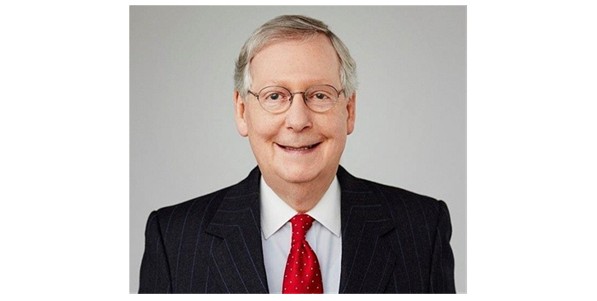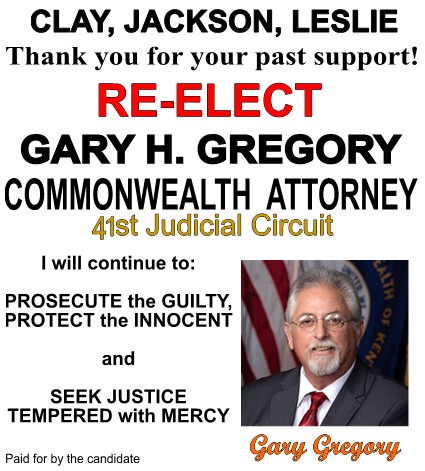'My roles as Majority Leader and a senior member of the Appropriations Committee mean Kentucky has a front-row seat...the Bluegrass State will receive the investments necessary to encourage growth and lift up families.'

U.S. Senate Majority Leader Mitch McConnell
WASHINGTON, D.C. – U.S. Senate Majority Leader Mitch McConnell (R-KY) led the Senate to pass the Fiscal Year 2021 government-funding bills that deliver necessary resources to provide for our national defense, continue important federal programs, and benefit Kentucky families and communities. As a senior member of the Senate Appropriations Committee, Senator McConnell secured the Kentucky priorities in the legislation, which now goes to President Donald Trump to be signed into law.
"Kentucky's priorities are once again at the center of the federal government funding bill. I was proud to lead the Senate to pass bipartisan legislation with vital coronavirus assistance as well as critical resources to support our farmers, address substance abuse, promote Kentucky's role in our national defense, facilitate broadband deployment, and combat invasive Asian Carp," said Senator McConnell. "My roles as Majority Leader and a senior member of the Appropriations Committee mean Kentucky has a front-row seat when major decisions are made. As a result, worthy causes across the Bluegrass State will receive the investments necessary to encourage growth and lift up families."
To help get more assistance to Kentuckians, Senator McConnell negotiated another targeted COVID-19 relief package that includes:
- Funding for vaccine distribution, so the success of Operation Warp Speed can save as many American lives as possible as fast as possible;
- A second round of job-saving Paycheck Protection loans to prevent layoffs at the hardest-hit small businesses;
- Additional federal unemployment benefits for laid-off Kentuckians, and extensions for several jobless programs that would otherwise have expired;
- More direct impact payments for Kentucky households, at the particular emphasis and leadership of President Trump;
- More resources for K-12 schools to reopen safely and get our kids' educations back on track; and
- Increased funding for broadband and rural broadband to help students learn during the pandemic.
To date, the Coronavirus Aid, Relief, and Economic Security (CARES) Act has had a more than $13 billion impact in Kentucky. Earlier this year, Senator McConnell introduced and led to passage the CARES Act, the biggest rescue package in history. This federal assistance includes more than $1.7 billion for Kentucky's state and local government response to COVID-19, more than $1.4 billion for Kentucky healthcare providers, and over $2 million to expand telehealth programs. Kentucky small businesses, farmers, and nonprofits accessed more than $5.2 billion in assistance through 50,000 PPP loans. Kentucky families have also received $4 billion in Economic Impact Payments from the U.S. Treasury.
Click HERE to read what Kentuckians are saying about Senator McConnell's leadership
The FY 2021 Government Funding Agreement contains the following important Kentucky priorities secured by Senator McConnell:
Supporting those in recovery and stopping the flow of illegal drugs in Kentucky communities
- $25 million for the transitional housing pilot program established under Senator McConnell's Comprehensive Addiction Recovery through Effective Employment and Reentry (CAREER) Act, which will direct approximately $1 million to Kentucky. The CAREER Act, which is a measure Senator McConnell and Congressman Andy Barr (KY-06) established in the landmark opioid package signed into law in 2018, helps address the devastating impact of substance abuse on America's workforce by connecting recovering individuals with career services and stable housing opportunities. CAREER's transitional housing pilot program will support long-term recovery by providing funding for temporary housing opportunities for individuals until they can arrange a more permanent living situation.
- $6 million for the competitive grant program established under the CAREER Act, which provides funding to treatment centers to help individuals in recovery transition back into the workforce.
- $50 million for the Community Oriented Policing Services (COPS) Anti-Heroin and Anti-Methamphetamine Task Force programs. Senator McConnell supported the increased funding for the Anti-Methamphetamine program to target this major problem endangering Kentucky families. The COPS funding supports state and local law enforcement agencies, including those in Kentucky, in their efforts to investigate the unlawful distribution of heroin, prescription opioids, and methamphetamines.
- $3.4 billion for the Community Development Block Grant (CDBG) program, which provides communities with resources to address their unique challenges, including the devastating effects from the opioid and substance abuse epidemic, especially for those communities in rural Kentucky.
- $541.5 million to help state and local law enforcement officials respond to the opioid and substance abuse epidemic. This includes $108 million for Drug Courts and Veteran's Treatment Courts.
- $484 million for the Byrne Memorial Justice Assistance Grant (Byrne JAG) program to support local law enforcement. Last year, Senator McConnell worked with state officials to secure millions to help Kentucky communities meet law enforcement needs, including supporting drug task forces throughout the Commonwealth.
- $194 million to support the National Guard Counter-Drug Program. The Kentucky National Guard, working with Appalachia HIDTA, Kentucky State Police, and other law enforcement agencies, will use funding from this program to support marijuana eradication efforts in Eastern Kentucky.
- $290 million for the High Intensity Drug Trafficking Area (HIDTA) Program to combat meth and opioid abuse. Earlier this year, Senator McConnell announced that Boyd County, Kentucky was chosen for inclusion in the Appalachia HIDTA program. McConnell advocated for Boyd County's inclusion into the HIDTA program, which provides law enforcement agencies in designated counties with coordination, equipment, technology and additional resources to combat drug production and trafficking. Senator McConnell has also fought for the expansion of the Appalachia HIDTA to include hard-hit counties across the state, including Jefferson County in 2009, Hardin County in 2012, Nelson and Madison Counties in 2014, and Montgomery and Powell Counties in 2018. He also helped secure the inclusion of Boone, Campbell and Kenton Counties into the Ohio HIDTA in 2016. Because of Senator McConnell's consistent advocacy, nearly half of all Kentuckians currently live in a HIDTA county.
- $102 million for the Drug Free Communities program. Senator McConnell is proud to support this special program, which provides funding to local communities to create educational programs and raise awareness about the dangers of substance abuse.
- $4 million for Comprehensive Opioid Recovery Centers (CORCs), which Congressman Brett Guthrie (KY-02) secured in 2018's landmark opioid legislation. Facilities will offer all FDA-approved treatments, counseling and wrap-around services for individuals working toward long-term recovery from substance abuse.
Supporting Kentucky's Critical Role in our National Defense
- Provides well-deserved pay raise for servicemembers.
- $84.3 million for new military construction projects in Kentucky, including $69.3 million for the new Van Voorhis Elementary School at Fort Knox and $15 million for the National Guard and Reserve Center building in Frankfort.
- $20 million to continue the NSA's Workforce Transformation Cyber Initiative Pilot Program, which supports the University of Louisville's healthcare cybersecurity certificate program for first responders and military veterans.
- $936 million for the Assembled Chemical Weapons Alternatives program—including $160 million in supplemental funding—which supports chemical demilitarization efforts at the Blue Grass Army Depot.
Fulfilling Obligation to Paducah Nuclear Workers
- Senator McConnell secured $316 million—a $2 million increase over last year's funding level—to support workers performing necessary environmental cleanup operations at the Paducah Gaseous Diffusion Plant (PDGP). Among other initiatives, funding will also support operations and critical facility upgrades at Paducah's DUF-6 conversion facility, which Senator McConnell established.
Combatting invasive Asian Carp in West Kentucky
- $25 million to fight the War on Asian Carp. Senator McConnell helped secure $25 million for this initiative last year. The U.S. Fish and Wildlife Service (USFWS) will use the funding to help remove Asian Carp, an invasive species, from waterways like Kentucky Lake and Lake Barkley. At Senator McConnell's request, USFWS deployed the advanced "Unified Method of Fishing" in 2020, which involves corralling Asian Carp into one location using electronic technology and extracting the fish from the water with specialized nets. This technique has been successful in controlling Asian Carp populations abroad, and the USGS has successfully deployed it in Missouri and Illinois.
Providing Permanent Tax Relief for Kentucky's Signature Spirit
- Permanently authorizes tax cuts in the Craft Beverage Modernization and Tax Reform Act, which were scheduled to expire at the end of the year. This legislation was first signed into law in 2017 as part of the Tax Cuts and Jobs Act and later extended for one year through the 2019 government funding package. It includes a number of priorities for Kentucky's craft beverage industry, including:
- Reduction in federal excise taxes and regulatory relief for Kentucky's distilleries, breweries and wineries.
- Senator McConnell's AGED Spirits Act, which allows distillers to deduct interest expense in the year it is paid, rather than at the end of the bourbon aging process.
Economic Development, Infrastructure and Preparing Students and Workers to Meet Their Bright Future
- $33 million for national broadband mapping to accurately identify areas that need improved service, which will help rural states, such as Kentucky.
- $115 million for the Abandoned Mine Land (AML) pilot program, $25 million of which will go to Kentucky for the development of projects on land previously used to mine coal to support economic development in Appalachia. As Senate Majority Leader, Senator McConnell worked with U.S. Congressman Hal Rogers (R-KY) to create the AML Pilot in 2015. So far, Senator McConnell and Congressman Rogers have helped secure $155 million from this federal program for Kentucky projects.
- $346 million for the Economic Development Administration (EDA), which provides federal competitive grants to communities to assist with economic development. This funding includes $33.5 million for EDA's Assistance to Coal Communities Program.
- $34 million for the American Printing House for the Blind in Louisville to continue its important work to create innovative products for visually impaired students and people across the country.
- $10 million in U.S. Department of Education funding to support work colleges like Berea College and Alice Lloyd College in Kentucky.
- $35 million through the U.S. Department of Labor (DOL) to provide career and training services to dislocated workers in rural areas, including dislocated coal workers in Kentucky.
- $2.6 billion in the U.S. Army Corps of Engineers' major construction account that will support the continued construction of the Kentucky Lock project for Kentucky's more than 20,000 maritime workers.
- $180 million for the Appalachian Regional Commission (ARC). This is record level funding for ARC and its important work in Eastern Kentucky. In particular, Senator McConnell helped secure ARC resources for the following priorities:
- $55 million for the Partnerships for Opportunity and Workforce and Economic Revitalization (POWER) grant program. Funding provided through POWER grants gives local organizations the tools they need to make a positive impact in their communities. For example, just this year a Kentucky organization received a $1.7 million POWER grant to establish new centers to help Kentuckians in recovery combat their substance abuse addictions. In the past two fiscal years, Senator McConnell has secured $105 million for the POWER grant program;
- $16 million for infrastructure and water projects in distressed counties in Central Appalachia. This program was established by Senator McConnell;
o $10 million to continue a program for high-speed broadband deployment in distressed counties in Central Appalachia that have been most negatively impacted by the downturn in the coal industry. Over the years, Senator McConnell and Congressman Rogers have worked with ARC to deliver $60 million for broadband development; and
- $10 million for a pilot project established by Senator McConnell to address the substance abuse crisis in Appalachia.
- $30 million for the Delta Regional Authority (DRA). DRA supports economic and infrastructure development in the Mississippi Delta region, including a number of counties in Western Kentucky.
- $100 million in dedicated funding for the Appalachian Development Highway System (ADHS), which will continue to fund the completion of 12 miles of road projects in Letcher and Pike Counties in Kentucky.
- $165 million for the Essential Air Service Program, which benefits the Barkley Regional Airport in Paducah and the Owensboro-Daviess County Regional Airport.
- $1 billion for the U.S. Department of Transportation's BUILD grant program, which funds critical infrastructure projects around the country. Senator McConnell is proud to support his constituents' applications for these grants, and has worked to bring over $286 million to construction projects across the Bluegrass State.
- A provision directing the USFWS to continue to support the Green River National Wildlife Refuge (GRNWR) in Henderson County and its goals of conservation as well as increased hunting and fishing opportunities. In 2018, Senator McConnell secured language directing the Department of Interior to establish the GRNWR. Senator McConnell joined Trump Administration officials at a ceremony officially designating the new wildlife refuge last year.
- $750 million for the Fossil Energy Research and Development Program, which includes support for research on clean coal technology as well as for research on rare earth elements. In years past, money from this program has gone to Kentucky to support clean coal technology, and the University of Kentucky Center for Applied Energy Research.
Hemp's Revival in Kentucky
- Kentucky has been at the forefront of hemp production ever since the authorization of industrial hemp pilot programs established by Senator McConnell's provision in the 2014 Farm Bill. When President Trump signed into law the 2018 Farm Bill, it included Senator McConnell's initiative to legalize hemp as an agricultural commodity by removing it from the federal list of controlled substances. The end of the year funding bills included:
- $4 million for the research of hemp through Agriculture Research Service (ARS) sites – like those in Lexington and Bowling Green, Kentucky.
- $5 million for ongoing medical research related to CBD.
- A provision that continues to direct the Farm Credit Administration to offer loans and other services to hemp producers and businesses.
- A provision extending Senator McConnell's 2014 Hemp Pilot Program to allow states like Kentucky—who have been participating in the pilot—ample time to transition to the new program once it is finalized by USDA.
- Support for competitive USDA grants for hemp projects.
- A provision directing the Drug Enforcement Agency to ensure state and local law enforcement have access to hemp-testing technology to enable law enforcement officials to distinguish between hemp and marijuana in the field.
- A provision directing the USDA to develop regulations that would protect the transportation and processing of hemp that may temporarily exceed a THC concentration of 0.3%.
###











